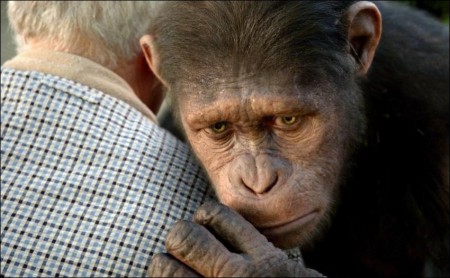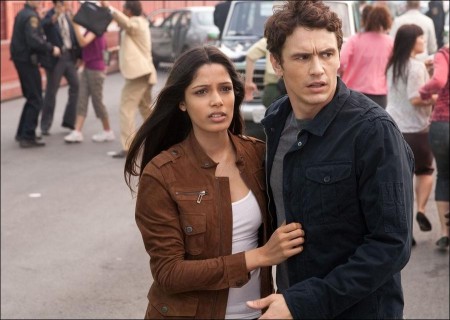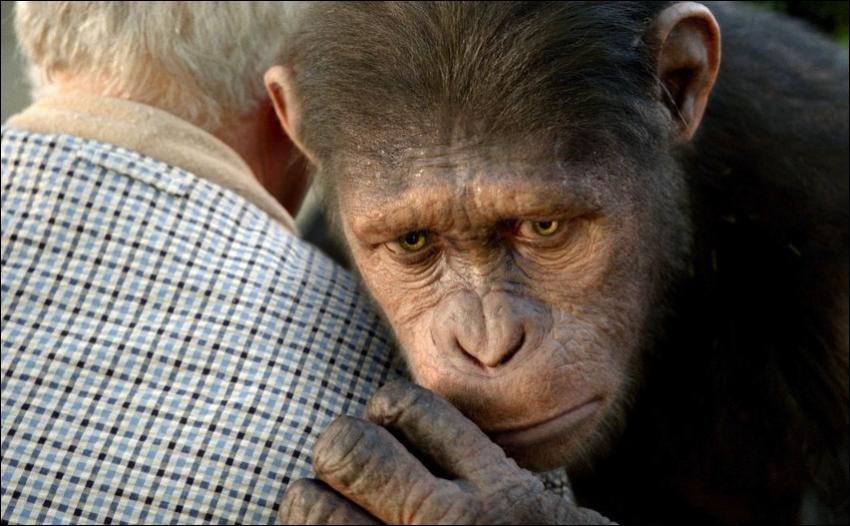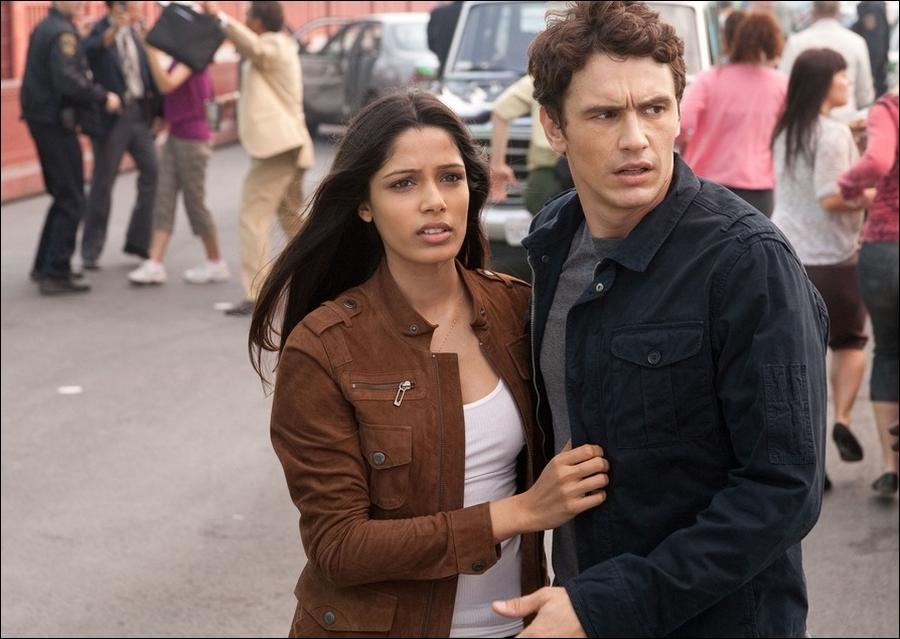Will secretly raises young Caesar as his own, at home, while caring for his ailing father. “Will must now be a caretaker, not only to Charles, but to this baby chimp,” says Franco. “As the story progresses Will becomes more of a person and less of a scientist, and starts to care about Caesar more than the success of the drug.”
Caesar is much more than a pet to Will; in fact, Will becomes a father figure to the very special chimp. “In some ways, this is a story about fathers and sons,” says writer-producer Amanda Silver, who penned the screenplay with her husband and writing partner Rick Jaffa. “Will becomes a father to his own father, as well as to Caesar.”
Adds John Lithgow: “The Will-Charles-Caesar dynamic is extraordinary. Will is losing his father to Alzheimer’s just as he’s gaining this ‘child,’ Caesar. That’s the emotional tension that sets the story in motion.”
Caesar leads Will to Caroline (Freida Pinto), a primatologist who serves as Caesar’s vet, and who becomes a key player in both of their lives. “Caroline loves the fact that Will cares for a chimpanzee so much that he almost treats him like his own son,” says Pinto. “She’s dedicated her life to apes, so she absolutely loves them and cares for them with all her heart.”
Due to exposure in the womb to the ALZ-112, young Caesar displays intelligence and behaviors unusual for an ape of any age. Inspired by his observation of Caesar’s unexpected gifts, Will surreptitiously obtains enough samples of ALZ-112 from Gen-Sys, and against his better judgment privately continues his research at home, using his father and Caesar as test subjects.
Over time, with the help of the drug, the chimp exhibits incredible cognitive skills and intellect. At the same time, Charles’ symptoms of Alzheimer’s miraculously go into remission. Will’s bending the rules of laboratory trials seems to have worked beyond his hopes. But as he soon discovers, it has taken him – and ultimately the entire human race – on a ruinous path.
“Will has crossed the line,” says Rick Jaffa. “He’s thinking, okay, we can cure Alzheimer’s and increase intelligence. And that’s when you start to play God and that’s when it gets dicey.”
“RISE OF THE PLANET OF THE APES explores arguably one of today’s most important issues,” states Peter Chernin. “We have these incredible scientific and medical tools at our disposal, and we’re asking the question, how far do you take them before you’re really messing with nature? What are the limitations?”
Will Rodman pushes those limitations to the breaking point and beyond, to catastrophic results. But before those dire consequences unfold, we get to know Caesar as a youngster and adolescent who, like a human child, is curious about the world around him. However, as Caesar matures, his highly-developed intelligence is countered by the aggressive and dangerous protective instincts typical of adult male apes.
Caesar soon becomes too much for Will and Caroline to handle. Will is reluctant to part with Caesar, who has become like a son; Caroline understands Will’s inner turmoil, but she knows that it is impossible for Caesar to remain with him. “Caroline insists that every animal needs open space and that you can’t expect a large animal – even a very special one like Caesar – to flourish inside a house,” Pinto explains. “Of course, she loves Will and Caesar, and understands why it’s so difficult for him to part with Caesar.”
Will takes Caesar to live among other apes within the confines of the San Bruno Primate Sanctuary. But unknown to Will, the “sanctuary” is more like a shoddily run prison – a dumping ground for unwanted or abandoned apes. It is run by Landon (Brian Cox, who starred in director Rupert Wyatt’s debut feature, the acclaimed The Escapist), and Landon’s son, Dodge, portrayed by Tom Felton. The latter’s work in RISE OF THE PLANET OF THE APES marks another inventive villainous turn following his role as the bullying Draco Malfoy in the Harry Potter film series, for which Felton was recently awarded an MTV Movie Award® for Best Villain.
Because he’s not the physically strongest ape in the facility, Caesar quickly realizes that in order to survive he must assert his intellectual dominance over the fearsome alpha-male ape Rocket, a beastly brooding angry gorilla named Buck, and a psychologically damaged orangutan named Maurice. Caesar soon prevails over the other apes, and establishes a new social order. At a pivotal and electric moment, Caesar stands up and retaliates against their cruel human handlers.
Says Dylan Clark: “We built the structure of our movie around that scene,” the specifics of which the filmmakers wish to keep a surprise. “It will be powerful and emotional.” Adds Rupert Wyatt: “We wanted it be a ‘world-stops-spinning’ moment that plays into the whole idea of evolution and where that can take a species.” That defining instant leads to a daring escape, an epic confrontation at San Francisco’s Golden Gate Bridge, a wrenching and fateful reunion between Will and Caesar – and a revolution that will forever change the planet.
Related Link: Read the Full Production Notes for Rise of the Planet of the Apes
Views: 190








